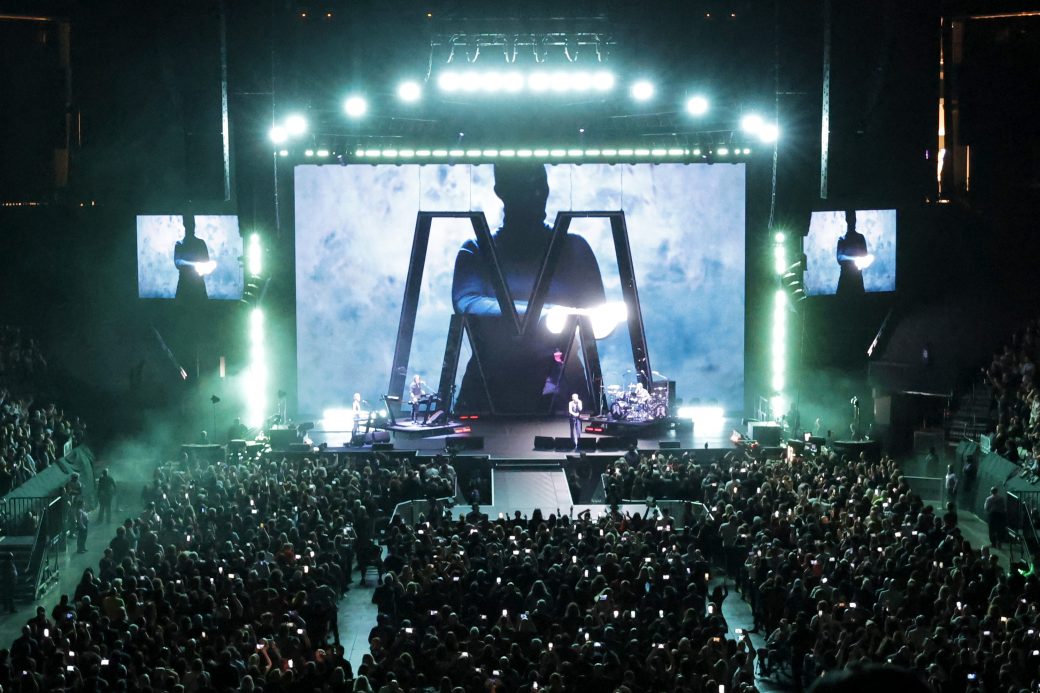Evolution of Sound: Depeche Mode
Defining the British new wave scene since 1981, Depeche Mode popularized synth-electronic sounds across their discography.
By bonneville on August 15, 2023

With a legacy that traces back to 1981, Depeche Mode has been an instrumental force within the British new wave movement. Spanning 15 studio albums, their catalog traverses synth-pop, electronic, and alternative rock realms, captivating a diverse audience transcending generations and music scenes. Their music resonates deeply with those who identify as outsiders, with lyrical themes centered around solitude and disconnection, offering solace to people drawn to darker synth music.
Their lineup and sound have changed over the years, and only Dave Gahan (lead vocalist) and Martin Gore (keyboards and guitar) remain from the original members. Vince Clarke, also on keyboards and guitar, left the band after the release of their first album in 1981 and was replaced by Alan Wilder, who would stay in the group for 13 years. And Andy Fletcher, who played bass guitar and keyboards, passed away in 2022 at 60.
Over the years, the band pivoted from upbeat synth-pop to darker and even heavy metal sounds, evolving their style and misfit themes. They were instrumental in popularizing synthesizers and electronic elements within the mainstream, inspiring generations of musicians. Keep reading to explore their evolution of sound.
Synth-pop beginnings: 1981-1988
“Speak & Spell,” their first album, broke them into the mainstream with the hits “Just Can’t Get Enough” and “New Life” charting in the UK. “A Broken Frame,” the band’s second album, was released the year after in 1982. It continued to explore the synth-pop sound that broke them through the mainstream in the UK, with themes of emotional turmoil and isolation signaling their darker turn.
“Construction Time Again” was released in 1983 and saw a dramatic shift in sound production. Wilder sampled noises of everyday objects such as clanging metal, machinery noises, and industrial ambiance to create a more eclectic and industrial sound. The following year, “People are People” would become an international hit, becoming the theme of West Germany’s coverage of the 1984 Olympics and a staple at gay clubs and LGBTQ festivals across the globe.
In the latter half of the ’80s, Depeche Mode’s musical style would take on even darker tones. “Black Celebration” and “Music for the Masses” moved away from their pop sounds and introduced more atmospheric and textured elements to their composition. These releases went into more experimental territories, with existential lyrics found on songs like “A Question of Time.”
International appeal: 1990-2001
From 1990 to 2001, Depeche Mode solidified their status as musical innovators. This period saw the release of pivotal albums like “Violator” (1990), “Songs of Faith and Devotion” (1993), “Ultra” (1997), and “Exiter” (2001), each offering a distinct yet cohesive exploration of themes and sounds.
“Violator,” the band’s most popular album to date, embraced a dark and sensual sound that merged new rock influences. The album’s hit singles “Personal Jesus” and “Enjoy the Silence” became anthems of the era, combining bluesy guitar riffs and electronic hooks. “Songs of Faith and Devotion” continued this evolution, delving into themes of spiritual searching and personal struggles. The album introduced organic instrumentation and gospel influences, creating a raw and emotionally charged atmosphere, best exemplified by tracks like “Walking in My Shoes.”
“Ultra” (1997) arrived after a hiatus and was marked by a sense of reflection and recovery. Wilder would leave the band in 1995, citing internal struggles during recording and touring. It featured a more stripped-down sound, reflecting Dave Gahan’s personal challenges to reach sobriety during their break. The album’s introspective themes are evident in songs like “Barrel of a Gun” and “It’s No Good,” which blend electronic elements with a more somber tone.
Continued musical innovation: 2005-2017
Depeche Mode continued its legacy of pushing musical boundaries and captivating audiences with innovative releases. This era saw the band experimenting with new sounds, embracing modern production techniques, and delving into themes that resonated deeply with both longtime fans and newcomers to their music.
The album “Playing the Angel” (2005) showcased the band’s ability to stay relevant while staying true to their essence. The album’s tracks blended electronic elements with raw energy, and songs like “Precious” and “John the Revelator” exemplified their ability to weave intricate narratives through electronic textures.
Their 2013 release, “Delta Machine,” embraced a darker, blues-infused atmosphere, creating a unique blend of electronic and rock elements. The album’s single “Heaven” exemplified their continued ability to craft emotionally resonant melodies.
Followed by “Spirit” (2017), the band presented a socially conscious angle, addressing themes of politics, unrest, and the human experience in the modern world. Tracks like “Where’s the Revolution” showcased their knack for fusing thought-provoking lyrics with cutting-edge production techniques. The album was followed by the production of “Spirits in the Forest,” a documentary produced by Anton Corbijn and released on DVD and Blu-Ray in 2020.
2020 also saw Depeche Mode inducted into the Rock and Roll Hall of Fame for their work.
Present status and influence
Artists across genres feel the impact of Depeche Mode’s work, influencing indie and alternative rock bands to heavy metal, deep house, and techno musicians. Several prominent artists, including Arcade Fire, Coldplay, Linkin Park, and Nine Inch Nails, cite Depeche Mode as profoundly influencing their work. And a resurgence of popularity for their single “Never Let Me Down Again” peaked after appearing in the HBO series “The Last of Us.”
“Memento Mori,” the band’s most recent release, came out earlier this year, followed by an announcement of a worldwide tour. The band continues to capture new generations of listeners while retaining their longtime fans. Catch their full discography before you see them to appreciate their sonic journey over the past 42 years.
Related articles:










